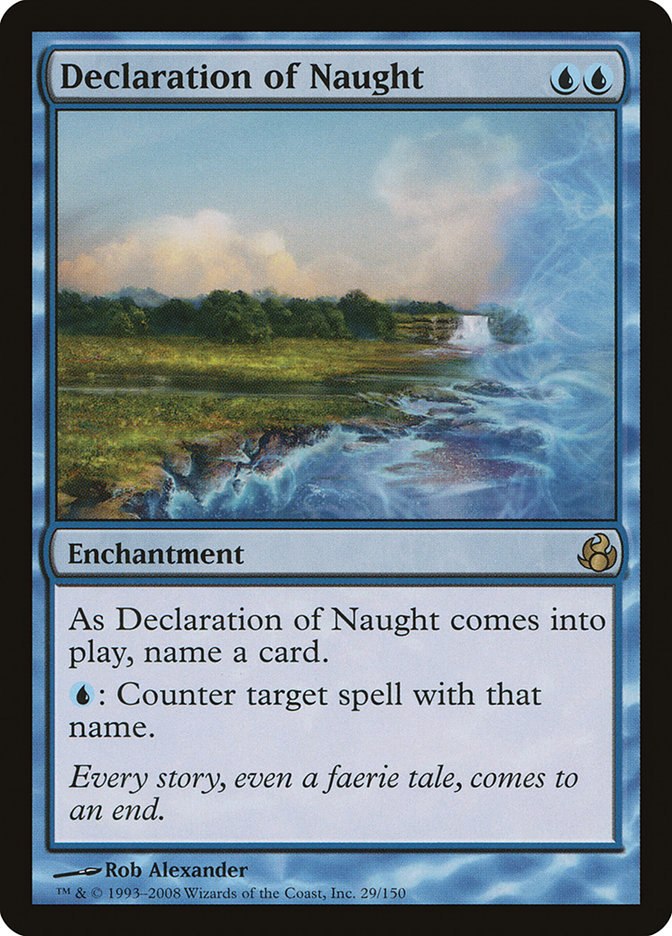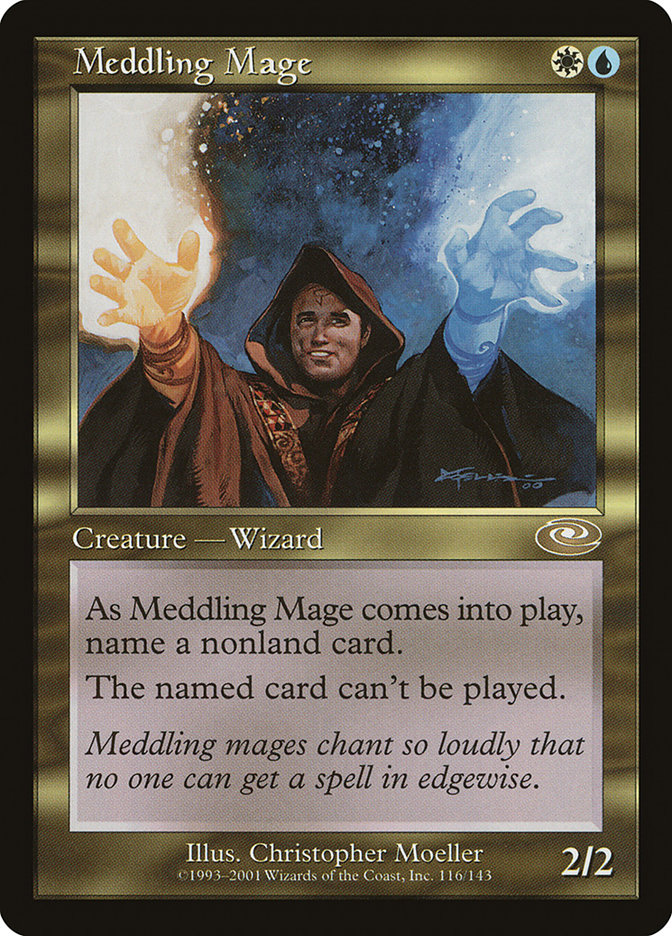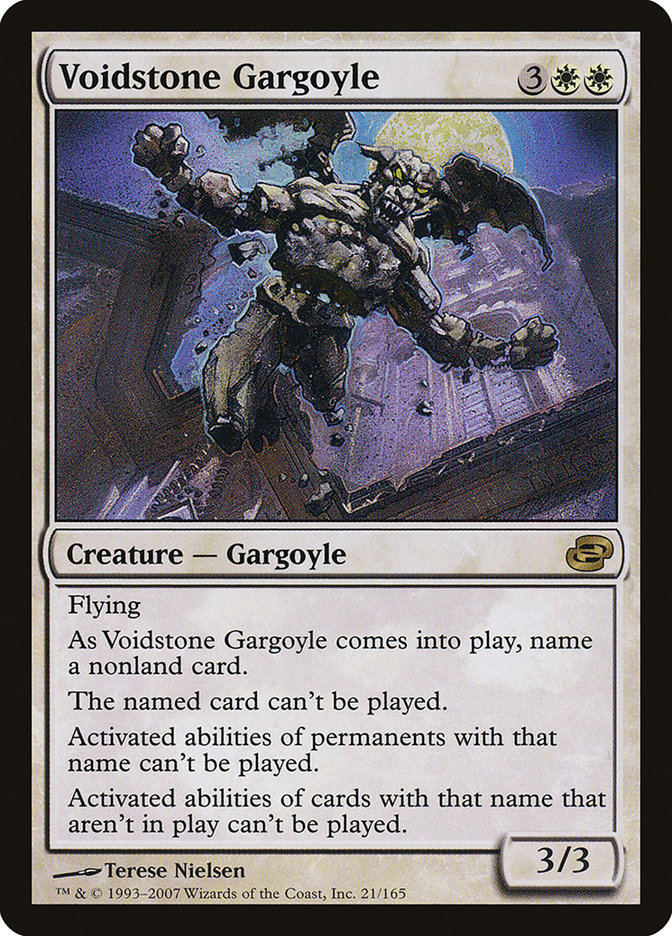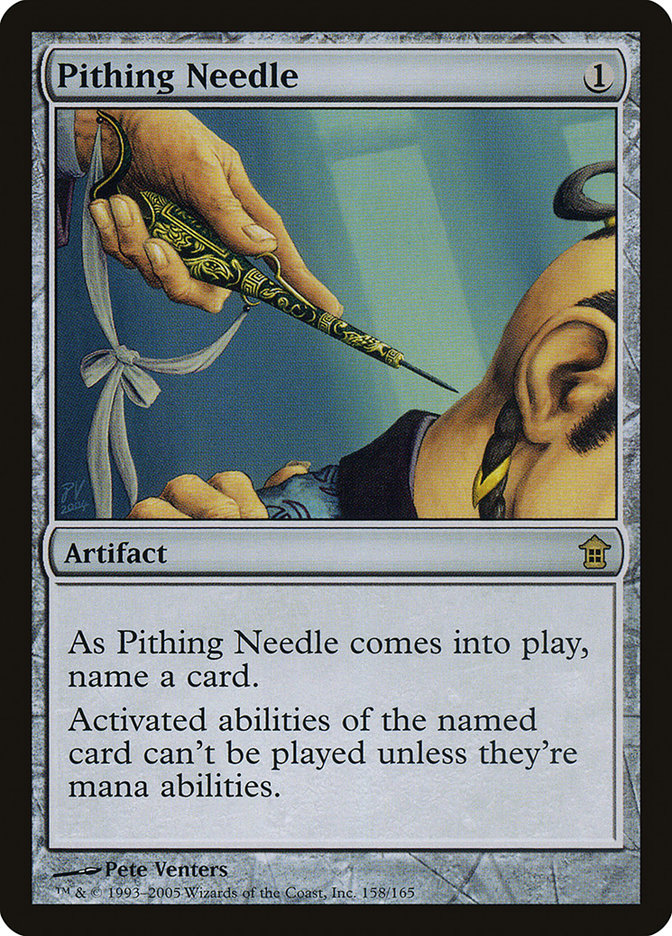Declaración de fracaso Carta MTG
| El coste de maná | |
| Costo de maná convertido | 2 |
| Rareza | Extraña |
| Tipo | Encantamiento |
| Liberado | 2008-02-01 |
| Coleccione símbolo | |
| Coleccione nombre | Morningtide |
| Coleccione código | MOR |
| Número | 29 |
| Frame | 2003 |
| Disposición | Normal |
| Border | Negra |
| Ilustrado por | Rob Alexander |
Texto de la carta
En cuanto la Declaración de fracaso entre en juego, nombra una carta. {U}: Contrarresta el hechizo objetivo con ese nombre.
Todas las historias, hasta los cuentos de hadas, terminan.
Cartas Similares
La Declaración del Vacío es un contraconjuro único en el mundo de Magic: The Gathering, que recuerda a cartas que permiten a los jugadores apuntar a amenazas específicas. Su similitud con el Mago entrometido es evidente ya que ambos pueden cerrar de forma preventiva cartas clave de la estrategia de un oponente. Sin embargo, la Declaración del Vacío se enfoca en contrarrestar hechizos mientras se lanzan, utilizando una habilidad repetible, lo que la diferencia de la naturaleza estática del Mago entrometido.
Otro análogo es el Gárgola de la Piedra del Vacío, que también nombra cartas para neutralizarlas. Sin embargo, difiere en su forma como criatura y en su función, anulando de manera preventiva habilidades en lugar de esperar a que se lancen los hechizos. Aquí es donde brilla la Declaración del Vacío, proporcionando un control continuo y flexibilidad táctica. La Aguja programadora también refleja la capacidad de nombrar cartas, pero solo desactiva habilidades activadas, no los propios lanzamientos de hechizos.
En última instancia, la Declaración del Vacío ofrece una herramienta de control dinámica para los jugadores. Resulta ser una carta formidable, especialmente en formatos donde predecir y contrarrestar hechizos clave puede cambiar el curso del juego. Cada alternativa aporta su propia estrategia y utilidad, sin embargo, el matiz de la capacidad de contrarresto de la Declaración del Vacío podría ser insuperable para aquellos que buscan controlar el flujo de la batalla.
Mazos que usan esta carta
Mazos MTG usando Declaración de fracaso. Profundiza en la estrategia de los mazos, cartas de aparador, lista de ideas y exportación para jugar en ARENA o MOL.
| # | Nombre | Formato | Arquetipo | Evento |
|---|---|---|---|---|
 | Turbo Fog | formato libre | Set Roulette Spring 2024 |
Aspectos Positivos de la Carta
Ventaja de Carta: La Declaración del Vacío puede proporcionar una ventaja al contrarrestar preventivamente hechizos clave en los que se basa tu oponente, reduciendo efectivamente sus recursos disponibles y interrumpiendo su estrategia mientras proteges tu propio plan de juego.
Aceleración de Recursos: Si bien la Declaración del Vacío en sí misma no es un acelerador de recursos, ayuda a preservar tus recursos al guardarlos para otros hechizos en lugar de usarlos para reaccionar a amenazas que puedes prevenir que tengan efecto.
Velocidad Instantánea: La Declaración del Vacío se puede jugar a velocidad instantánea, dándote la flexibilidad de responder a las acciones de tu oponente durante su turno o al final de su turno, manteniéndolos en la incertidumbre sobre tus capacidades y manteniéndote ágil en tu estrategia.
Aspectos Negativos de la Carta
Requisito de Descarte: Cuando se trata de la Declaración del Vacío, la necesidad de identificar un nombre de hechizo al activarla puede considerarse como un tipo de descarte. Debes decidir con cuidado y elegir sabiamente, o correr el riesgo de que el encantamiento se convierta en una carta inútil contra una estrategia inesperada del oponente.
Costo de Maná Específico: Este encantamiento requiere dos manás azules. Para jugadores que juegan con mazos multicolores, el costo de doble azul limita la flexibilidad de maná, complicando potencialmente su uso en algo distinto a mazos mono-azules o intensamente azules.
Costo de Maná Comparativamente Alto: Si bien dos puntos de maná no parecen excesivos, el hecho es que la Declaración del Vacío es una inversión en una posible recompensa futura. Depende de que el oponente juegue la carta nombrada, lo que puede no ocurrir en cada enfrentamiento, lo que conduce a un maná que podría haberse asignado para amenazas u oportunidades inmediatas.
Razones para Incluir en tu Colección
Versatilidad: La Declaración del Vacío ofrece una forma única de control que se puede adaptar a cualquier situación. Con su capacidad de nombrar una carta y contrarrestar cualquier hechizo con ese nombre, puede obstaculizar las estrategias clave de los oponentes o proteger tus intereses en diferentes enfrentamientos.
Potencial de Combo: Esta carta abre espacio para combos creativos en mazos que aprovechan las tácticas de permiso y control. Puede funcionar en conjunto con cartas que echen un vistazo a las manos de los oponentes o con aquellas que se benefician de que se contrarresten hechizos, aumentando así la sinergia general.
Relevancia en el Meta: En un entorno de juego dominado por ciertos hechizos poderosos, la Declaración del Vacío puede ser como una bala de plata. Es particularmente efectiva cuando eres consciente de las amenazas comunes predominantes en el metajuego actual, lo que te permite cerrar preventivamente los planes de los oponentes.
Cómo Vencer
Enfrentarse a una Declaración del Vacío en el campo de batalla requiere previsión estratégica y comprensión de cómo desmantelar su control. Este encantamiento azul permite a un jugador contrarrestar cualquier hechizo con un nombre elegido mientras permanezca en el campo. Clave para vencer a la Declaración del Vacío es diversificar las amenazas, lo que puede diluir su poder para neutralizar un solo hechizo. El uso de hechizos que no pueden ser contrarrestados, como la Decadencia Abrupta o el Veredicto Soberano, ofrece un camino confiable para pasar por alto su fuerza restrictiva.
La eliminación de artefactos es otra táctica para despejar el camino, con opciones como Désencanter y Naturalizar, dando a los jugadores la oportunidad de destruir este molesto encantamiento directamente. Los mecanismos de disrupción de mano, especialmente aquellos que extraen cartas específicas antes de que sean jugadas, como Adivinación del Pensamiento o Inquisición de Kozilek, pueden evitar que un oponente establezca la barrera defensiva de la Declaración del Vacío en primer lugar.
Presión constante y adaptabilidad definen el enfoque necesario para triunfar sobre la Declaración del Vacío. Introducir múltiples vías hacia la victoria puede abrumar el enfoque singular del encantamiento, abriendo un camino para superar esta pieza de control en tus enfrentamientos de MTG.
Donde comprar
Si estás buscando comprar una carta MTG Declaración de fracaso de un coleccione específico como Morningtide, existen varias opciones confiables que debes considerar. Una de las fuentes principales es tu tienda de juegos local, donde a menudo puedes encontrar paquetes de refuerzo, cartas individuales y mazos preconstruidos de colecciones actuales y pasadas. A menudo ofrecen el beneficio adicional de una comunidad donde puedes intercambiar con otros jugadores.
Para un inventario más amplio, particularmente de colecciones más antiguos, mercados en línea como TCGPlayer, Card Kingdom y Card Market ofrecen amplias selecciones y te permiten buscar cartas de colecciones específicos. Las plataformas de comercio electrónico más grandes como eBay y Amazon también tienen listados de varios vendedores, lo que puede ser un buen lugar para buscar productos sellados y hallazgos raros.
Además, el sitio oficial de Magic suele tener un localizador de tiendas y listas de minoristas para encontrar Wizards of the Productos con licencia costera. Recuerde comprobar la autenticidad y el estado de las cartas al comprarlas, especialmente a vendedores individuales en mercados más grandes.
A continuación se muestra una lista de algunos sitios web de tiendas donde puede comprar las Declaración de fracaso y otras cartas MTG:
 COMPRAR
COMPRAR BurnMana es un socio oficial de TCGPlayer
- eBay
- Card Kingdom
- Card Market
- Star City Games
- CoolStuffInc
- MTG Mint Card
- Hareruya
- Troll and Toad
- ABU Games
- Card Hoarder Magic Online
- MTGO Traders Magic Online
Ver productos MTG
Legalidades
Formatos de Magic the Gathering donde Declaración de fracaso tiene restricciones
| Formato | Legalidad |
|---|---|
| Commander | Legal |
| Legacy | Legal |
| Modern | Legal |
| Oathbreaker | Legal |
| Vintage | Legal |
| Duel | Legal |
| Predh | Legal |
| Penny | Legal |
Reglas e información
La guía de referencia para las reglas de las cartas Declaración de fracaso de Magic: The Gathering proporciona las reglas oficiales, las erratas emitidas, así como un registro de todas las modificaciones funcionales que se han producido.
| Fecha | Texto |
|---|---|
| 01/04/2008 | Puedes nombrar solo una mitad de una carta dividida, pero no ambas. Si un jugador lanza la mitad con el nombre elegido, puede ser objetivo de la segunda habilidad. Además, si un jugador lanza un hechizo dividido fusionado con el nombre elegido, puede ser objetivo de la segunda habilidad. |



